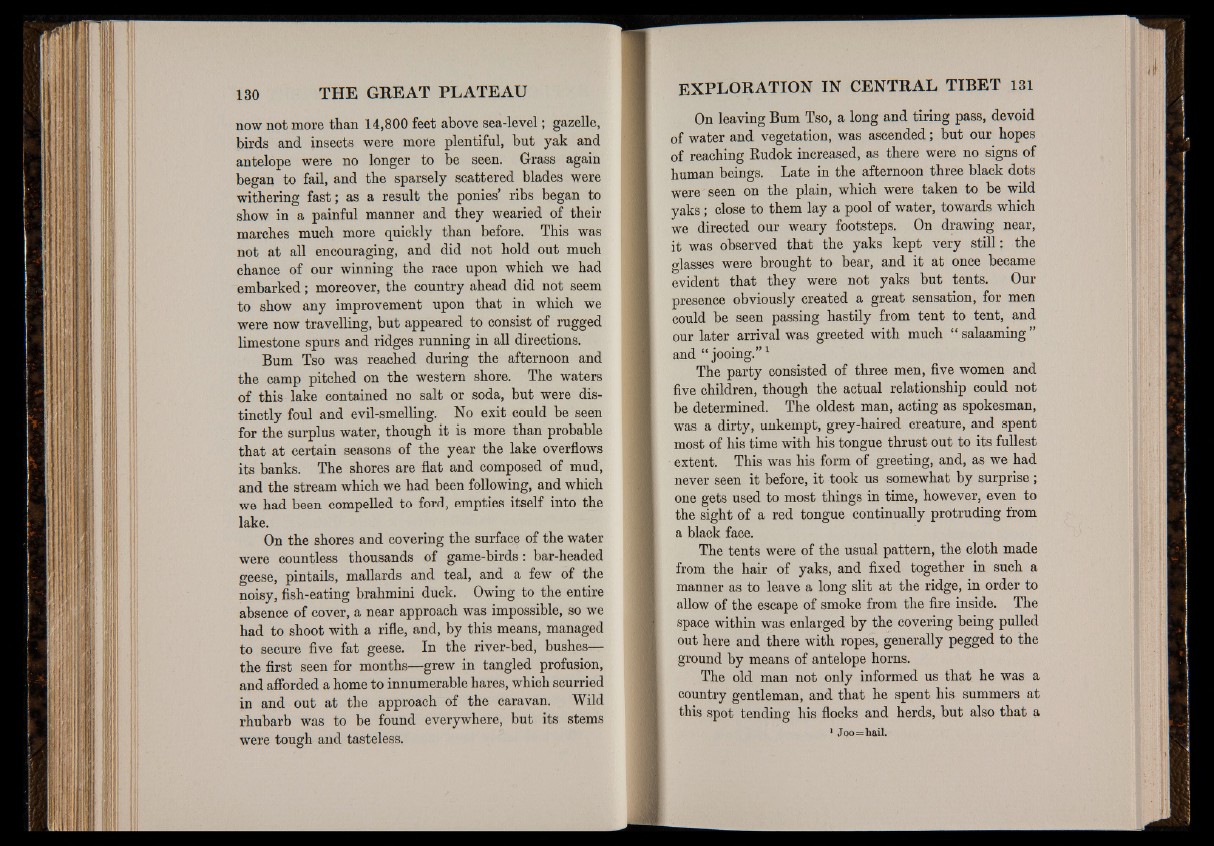
now not more than 14,800 feet above sea-level; gazelle,
birds and insects were more plentiful, but yak and
antelope were no longer to be seen. Grass again
began to fail, and the sparsely scattered blades were
withering fast; as a result the ponies’ ribs began to
show in a painful manner and they wearied of their
marches much more quickly than before. This was
not at all encouraging, and did not hold out much
chance of our winning the race upon which we had
embarked; moreover, the country ahead did not seem
to show any improvement upon that in which we
were now travelling, but appeared to consist of rugged
limestone spurs and ridges running in all directions.
Bum Tso was reached during the afternoon and
the camp pitched on the western shore. The waters
of this lake contained no salt or soda, but were distinctly
foul and evil-smelling. No exit could be seen
for the surplus water, though it is more than probable
that at certain seasons of the year the lake overflows
its banks. The shores are flat and composed of mud,
and the stream which we had been following, and which
we had been compelled to ford, empties itself into the
lake.
On the shores and covering the surface of the water
were countless thousands of game-birds: bar-headed
geese, pintails, mallards and teal, and a few of the
noisy, fish-eating brahmini duck. Owing to the entire
absence of cover, a near approach was impossible, so we
had to shoot with a rifle, and, by this means, managed
to secure five fat geese. In the river-bed, bushes—
the first seen for months—grew in tangled profusion,
and afforded a home to innumerable hares, which scurried
in and out at the approach of the caravan. Wild
rhubarb was to be found everywhere, but its stems
were tough and tasteless.
On leaving Bum Tso, a long and tiring pass, devoid
of water and vegetation, was ascended; but our hopes
of reaching Rudok increased, as there were no signs of
human beings. Late in the afternoon three black dots
were seen on the plain, which were taken to be wild
yaks; close to them lay a pool of water, towards which
we directed our weary footsteps. On drawing near,
it was observed that the yaks kept very still; the
glasses were brought to bear, and it at once became
evident that they were not yaks but tents. Our
presence obviously created a great sensation, for men
could be seen passing hastily from tent to tent, and
our later arrival was greeted with much “ salaaming ”
and “ jooing.” 1
The party consisted of three men, five women and
five children, though the actual relationship could not
be determined. The oldest man, acting as spokesman,
was a dirty, unkempt, grey-haired creature, and spent
most of his time with his tongue thrust out to its fullest
extent. This was his form of greeting, and, as we had
never seen it before, it took us somewhat by surprise;
one gets used to most things in time, however, even to
the sight of a red tongue continually protruding from
a black face.
The tents were of the usual pattern, the cloth made
from the hair of yaks, and fixed together in such a
manner as to leave a long slit at the ridge, in order to
allow of the escape of smoke from the fire inside. The
space within was enlarged by the covering being pulled
out here and there with ropes, generally pegged to the
ground by means of antelope horns.
The old man not only informed us that he was a
country gentleman, and that he spent his summers at
this spot tending his flocks and herds, but also that a
1 Joo=hail.